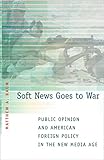Soft News Goes to War : Public Opinion and American Foreign Policy in the New Media Age / Matthew A. Baum.
Material type: TextPublisher: Princeton, NJ : Princeton University Press, [2011]Copyright date: ©2003Edition: Course BookDescription: 1 online resource (344 p.) : 38 line illus. 31 tablesContent type:
TextPublisher: Princeton, NJ : Princeton University Press, [2011]Copyright date: ©2003Edition: Course BookDescription: 1 online resource (344 p.) : 38 line illus. 31 tablesContent type: - 9780691123776
- 9781400841288
- 070.1 070.1/95
- PN4888 .T4 B34 2011
- online - DeGruyter
- Issued also in print.
| Item type | Current library | Call number | URL | Status | Notes | Barcode | |
|---|---|---|---|---|---|---|---|
 eBook
eBook
|
Biblioteca "Angelicum" Pont. Univ. S.Tommaso d'Aquino Nuvola online | online - DeGruyter (Browse shelf(Opens below)) | Online access | Not for loan (Accesso limitato) | Accesso per gli utenti autorizzati / Access for authorized users | (dgr)9781400841288 |
Browsing Biblioteca "Angelicum" Pont. Univ. S.Tommaso d'Aquino shelves, Shelving location: Nuvola online Close shelf browser (Hides shelf browser)

|

|

|

|

|

|

|
||
| online - DeGruyter From Communists to Foreign Capitalists : The Social Foundations of Foreign Direct Investment in Postsocialist Europe / | online - DeGruyter Purposive Interpretation in Law / | online - DeGruyter Gurus, Hired Guns, and Warm Bodies : Itinerant Experts in a Knowledge Economy / | online - DeGruyter Soft News Goes to War : Public Opinion and American Foreign Policy in the New Media Age / | online - DeGruyter Poverty Traps / | online - DeGruyter Producing Security : Multinational Corporations, Globalization, and the Changing Calculus of Conflict / | online - DeGruyter How Policies Make Citizens : Senior Political Activism and the American Welfare State / |
Frontmatter -- CONTENTS -- PREFACE -- CHAPTER ONE. War and Entertainment -- CHAPTER TWO. Soft News and the Accidentally Attentive Public -- CHAPTER THREE. "I Heard It on Oprah" -- CHAPTER FOUR. Bringing War to the Masses -- CHAPTER FIVE. Tuning Out the World Isn't as Easy as It Used to Be -- CHAPTER SIX. Rallying Round the Water Cooler -- CHAPTER SEVEN. Soft News and World Views: Foreign Policy Attitudes of the Inattentive Public -- CHAPTER EIGHT. Soft News, Public Opinion, and American Foreign Policy: The Good, the Bad, and the Merely Entertaining -- NOTES -- REFERENCES -- INDEX
restricted access online access with authorization star
http://purl.org/coar/access_right/c_16ec
The American public has consistently declared itself less concerned with foreign affairs in the post-Cold War era, even after 9/11, than at any time since World War II. How can it be, then, that public attentiveness to U.S. foreign policy crises has increased? This book represents the first systematic attempt to explain this apparent paradox. Matthew Baum argues that the answer lies in changes to television's presentation of political information. In so doing he develops a compelling "byproduct" theory of information consumption. The information revolution has fundamentally changed the way the mass media, especially television, covers foreign policy. Traditional news has been repackaged into numerous entertainment-oriented news programs and talk shows. By transforming political issues involving scandal or violence (especially attacks against America) into entertainment, the "soft news" media have actually captured more viewers who will now follow news about foreign crises, due to its entertainment value, even if they remain uninterested in foreign policy. Baum rigorously tests his theory through content analyses of traditional and soft news media coverage of various post-WWII U.S. foreign crises and statistical analyses of public opinion surveys. The results hold key implications for the future of American politics and foreign policy. For instance, watching soft news reinforces isolationism among many inattentive Americans. Scholars, political analysts, and even politicians have tended to ignore the soft news media and politically disengaged citizens. But, as this well-written book cogently demonstrates, soft news viewers represent a largely untapped reservoir of unusually persuadable voters.
Issued also in print.
Mode of access: Internet via World Wide Web.
In English.
Description based on online resource; title from PDF title page (publisher's Web site, viewed 29. Jul 2021)


